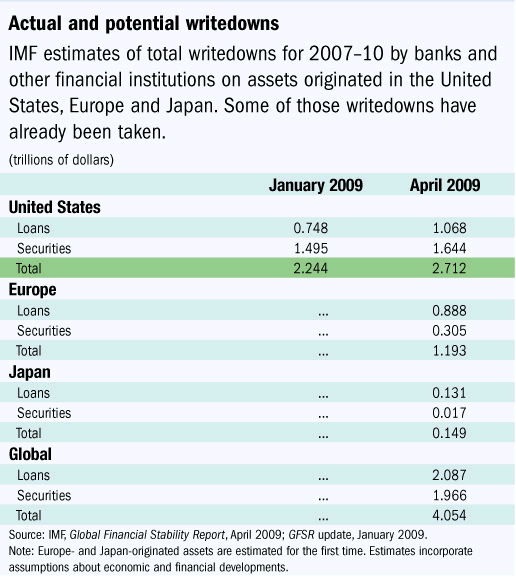
Typical street scene in Santa Ana, El Salvador. (Photo: iStock)
IMF Survey: Further Action Needed to Reinforce Signs of Market Recovery: IMF
April 21, 2009
- Credit losses have continued to grow; most being borne by banks
- Government action gradually beginning to restore market confidence
- Decisive policy actions required, particularly on bank cleanup, recapitalization
An unprecedented policy response to the global economic crisis—including the recent expansion of resources for international institutions and the IMF’s enhanced lending framework—is gradually beginning to restore market confidence, the IMF said.

Computer factory in Lodz, Poland: of emerging markets, eastern European economies hardest hit by global economic crisis, IMF says (photo: Dell/Reuters)
GLOBAL FINANCIAL CRISIS
But in its semiannual Global Financial Stability Report (GFSR), released April 21, the IMF warned that the challenges to restoring financial stability remain significant.
“Continued decisive and effective action is needed to preserve and strengthen these first signs of improvement, and to help provide a more stable and resilient platform for sustained global growth,” José Viñals, Financial Counsellor and Director of the IMF’s Monetary and Capital Markets Department, said.
In particular, emerging market risks have risen the most in the past six months, the report said. The retrenchment of capital flows is straining economies that have relied on foreign-financed credit growth, while the deteriorating economic environment has increased expected bank writedowns and raised the need for fresh capital in emerging market banks, Viñals told reporters.
A toll on bank balance sheets
The credit deterioration is taking an increasing toll on bank balance sheets, with the IMF emphasizing the need to cleanse them of impaired assets. Writedowns continue to mount as the collapse of economic activity leaves companies and individuals increasingly unable to repay borrowings. Banks will have to rebuild capital as a result of credit losses.
The report uses two scenarios to estimate the amount of capital necessary to restore banks’ buffers to levels that the market believes would permit banks to operate in today’s environment.
• Under one scenario, capital injections totaling $875 billion would be necessary for banks located in the United States and Europe using a common measure of leverage— tangible common equity (TCE) to tangible assets (TA)—of 4 percent, the level prevailing before the crisis. Estimated equity requirements for banks in the United States by the end of 2010 are about $275 billion; for the euro area, $375 billion; for the United Kingdom, $125 billion; and for banks in other advanced economies in Europe outside the euro area, about $100 billion.
• At a somewhat more demanding TCE/TA ratio of 6 percent, the amount of needed capital rises accordingly. Banks would not necessarily have to raise all of this amount. Some of this capital could come from the conversion of preferred shares to common equity or from the implicit guarantees of some governments to cover bank losses on some sets of assets.
The estimates of needed injections are based on the roughly $2.8 trillion losses that banks will incur from the start of the crisis through 2010 and reflect losses already taken and bank earnings this year and next that can be used to bolster capital.TCE is essentially total equity, less preferred shares and intangible assets, while TA reflects loans and other common bank assets less intangible assets such as a goodwill that cannot be measured or counted.
Overall global writedowns
For all financial institutions, the report estimates that writedowns on assets that were originated in the United States will total about $2.7 trillion, up from the roughly $2.2 trillion projected in an interim report in January. The $2.7 trillion writedown (off a total of about $27 trillion in U.S.-originated assets) covers both losses already recognized and those yet to come this year and next and incorporate a number of assumptions about the economic outlook and financial conditions.
The latest GFSR extends its writedown estimates to include losses on loans and related securities that were originated in Europe and Japan (see table), which will total approximately $1.3 trillion.
The Fund estimates that potential writedowns, including about $1 trillion already taken, could be nearly $4.1 trillion on some $58 trillion of assets originated in the United States, Europe, and Japan (although the owners of these assets can be anywhere in the world). The assumptions used to make these broader estimates are subject to significant uncertainty. The estimates could be lower depending upon policy actions and more favorable outcomes than assumed.
Banks will likely bear about two-thirds of the $4.1 trillion in writedowns, which together with their exposure to emerging markets, is about $2.8 trillion in actual and potential writedowns. Writedowns will also be borne by other financial institutions, including pension funds and insurance companies, the GFSR said.
Emerging markets feel the impact
As institutions reduce assets during a period of deleveraging, international capital flows to emerging markets have been curtailed. The effects have been harsh in some cases. The retrenchment from cross-border markets is outpacing the overall deleveraging process. On balance, emerging markets could experience net outflows of private capital in 2009, with but slim chances of recovery in 2010 and 2011. Banks in countries which were dependent on such cross border flows have suffered greatly, but the effects are also being felt by companies in many emerging market.
Within emerging markets, eastern European economies have been the hardest hit. The linkages between western Europe and emerging European banking systems make the region particularly vulnerable. Western European banks may reduce the funding of their eastern European subsidiaries and losses from emerging Europe may damage western European balance sheets. Fortunately, there are promising regional initiatives in which some western banks have agreed to keep credit flowing to the subsidiaries.
Buttressing IMF lending
In response to the widespread nature of the crisis, the IMF overhauled its lending framework and, at its summit in London on April 2, the Group of Twenty industrial and emerging market countries supported a large expansion of the Fund’s resources—from $250 billion to $750 billion. The changes in the IMF’s lending framework include more emphasis on crisis prevention, facilitating larger and more frontloaded financing, and further streamlining conditions attached to IMF loans.
Since the approval of the IMF’s reforms, external credit and credit default swap spreads (essentially the price of insuring repayment) on emerging market sovereign debt have tightened as markets have become reassured that sizeable external resources will be made available as needed.
Further government help
Overall, further decisive and effective policy actions will be needed to stabilize the international financial system. The global response to date has been rapid, but often piecemeal and insufficient to bolster public confidence. In particular, the global banking system needs to be cleansed of its impaired assets. Supervisors must determine whether a bank is viable. Banks that are viable but have insufficient capital will need to receive capital infusions. If such infusions are unavailable from private sources, then public money will have to be used.
In some cases, partial, or even total, government ownership will be required to assure adequate capitalization and an effective restructuring plan. A government should aim to ensure that banks can return to private ownership as expeditiously as possible. Banks that are not viable should be resolved promptly.
Financial policies must work constructively with other macroeconomic policies—both are needed to short-circuit the adverse feedback loop between the financial system and the economy through which deteriorating financial conditions lower economic activity, which in turn makes it harder for companies and individuals to repay borrowings, with an adverse impact on financial conditions. It is essential to stabilize the financial system—without which a robust and sustained economic recovery will be difficult to attain.

Comments on this article should be sent to imfsurvey@imf.org


